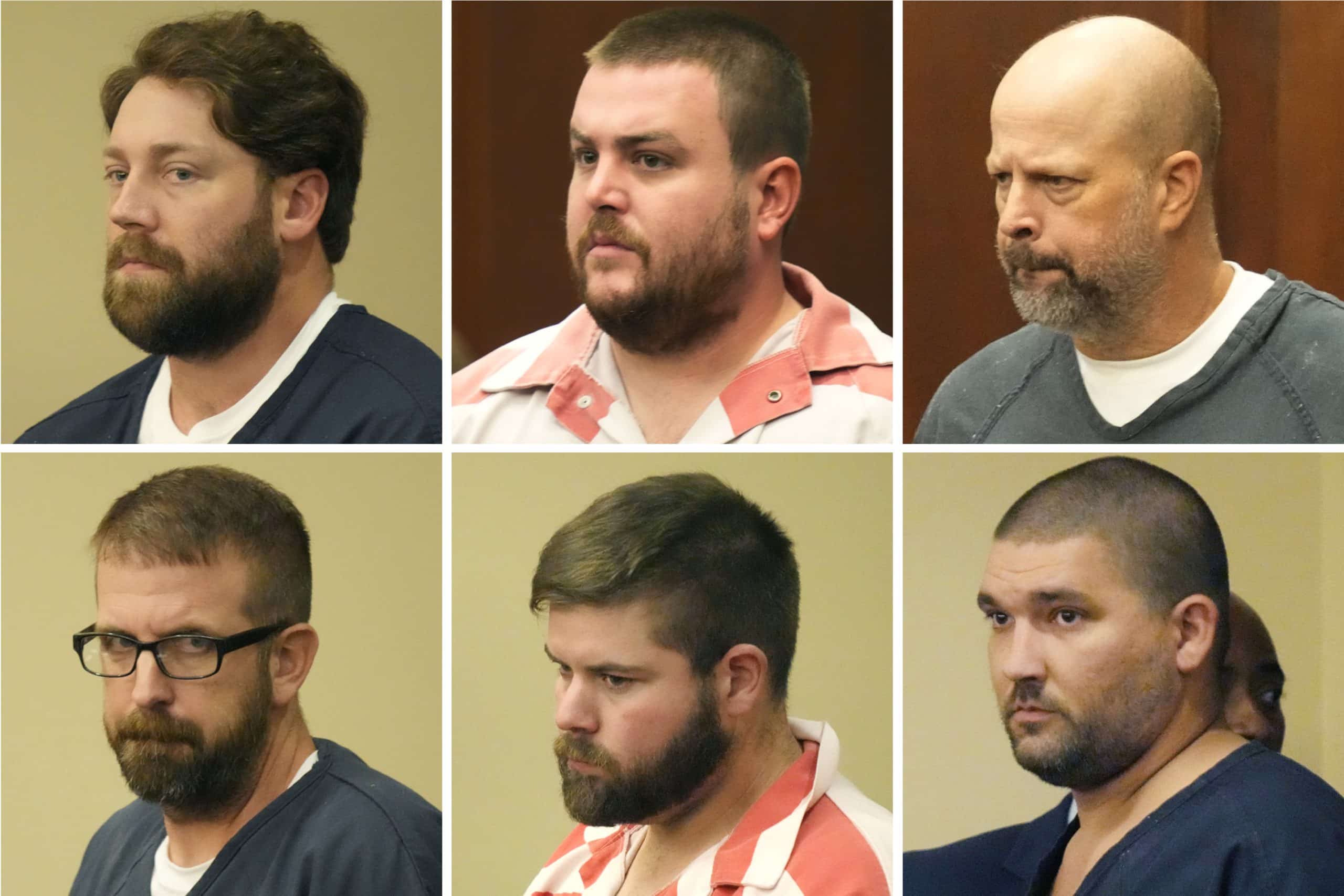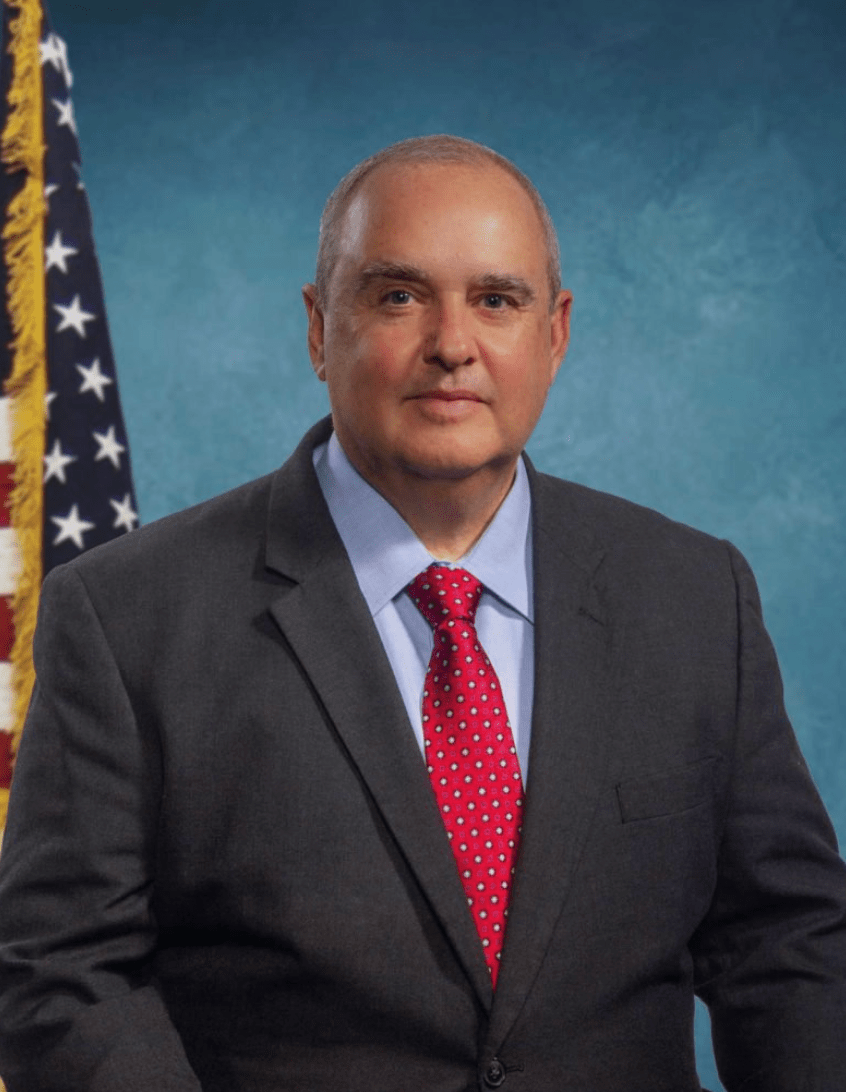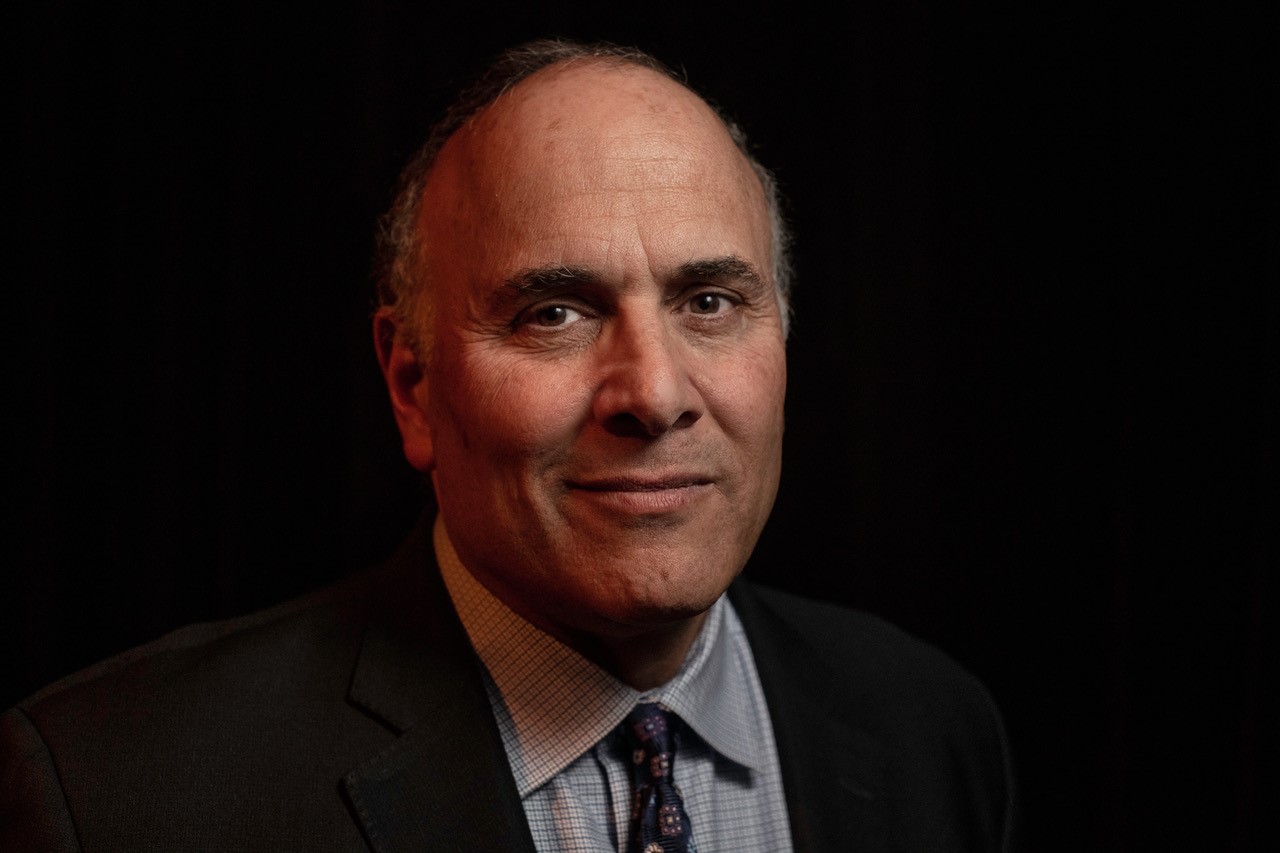Mississippi Today
Rankin County DA reviewing ‘Goon Squad’ cases. Legal experts say that’s not enough.

Rankin County District Attorney Bubba Bramlett confirmed that his office is reviewing criminal cases involving Rankin County’s “Goon Squad,” but he won’t divulge details, including how many cases have been dismissed and how far back his review will go.
In August, five deputies for the Rankin County Sheriff’s Department and a Richland police officer pleaded guilty to state and federal charges in a “Goon Squad” operation. Seven months earlier, they broke into a house without a warrant, tortured two Black men, Michael Corey Jenkins and Eddie Terrell Parker, threatened to use a sex toy on them and shoved a gun in Jenkins’ mouth and shot him. To conceal their crimes, they destroyed surveillance footage, planted false evidence and lied to investigators.
What these six officers did “violated the public trust and shook the foundation of our justice system,” Bramlett told Mississippi Today in a statement.
After learning of these crimes, “my office immediately conducted an extensive review to identify any and all cases in which these officers were involved,” he said. “We then reviewed each of those identified cases to determine if their testimony would be essential in the prosecution of that case.

“As a result, my office moved to dismiss those indicted cases and declined those cases which were not yet indicted, wherein the integrity of the investigation may have been compromised. This is an ongoing process in which we will continue to review and identify cases involving those officers and act accordingly.”
An investigation by the Mississippi Center for Investigative Reporting at Mississippi Today and The New York Times uncovered allegations that torture, coerced statements and false incident reports involving these six officers and more than a dozen others may stretch back two decades. Some of those interviewed alleged that deputies also planted evidence and filed false charges against them.
On March 19-21, five former Rankin County deputies and one former Richland police officer are slated to be sentenced in federal court for their roles in the torture of Jenkins and Parker.
When Mississippi Today asked the district attorney how many cases have been dismissed so far, whose charges were dismissed and how far back prosecutors plan to go in examining cases, he declined to answer those questions.
Since last August, prosecutors have asked judges to dismiss 25 drug indictments in Rankin County Circuit Court.
Seven dismissals don’t appear connected to Goon Squad actions. In two cases, co-defendants took the blame for crimes. In another two, defendants died. In three cases, indictments were dismissed because defendants pleaded guilty in other cases or because of speedy trial issues.
One dismissal cited the involvement of a Goon Squad member: “The State has learned that former Rankin County Deputy Christian Dedmon’s involvement in this case would make a prosecution of this matter untenable.”
One mentions the unavailability of an essential witness, and another cites new evidence. One dismissal discusses “the discovery of facts that make a prosecution of this matter untenable.”
In the dismissal of 14 indictments, prosecutors gave no reason other than it was in “the interest of justice.”

Steven Drizin, co-director of the Center on Wrongful Convictions at Northwestern University School of Law, said a systematic review must take place of all cases involving these officers.
“It will be painful because it may require that many convictions are vacated, and many old wounds of victims will be reopened,” he said, “but it is necessary to restore the public’s faith in law enforcement and, in many instances, the district attorney’s office who relied on these officers for years and may have ignored warning signs.”
Drizin said the problem with prosecutors reviewing these cases is they “will have to judge some of their own colleagues and police officers who they may have worked with. Any review that they do will be subject to bias.”
Matt Steffey, professor of law at the Mississippi College School of Law, questioned why the district attorney limited his review to whether Goon Squad officers’ testimony was essential when these same officers have admitted they planted false evidence on innocent people.
He recommended that someone “do the tough work of looking at all cases” and that whoever does it, there must be transparency. Declining to say how far back prosecutors plan to go in looking at cases “is certainly not transparent,” he said.

He noted that a review by prosecutors could be questioned because of potential conflicts. The sheriff’s daughter, Alexis Bailey Smith, works as an administrative assistant-paralegal in the district attorney’s office and earns $56,000 a year, according to the minutes of the Rankin County Board of Supervisors.
Steffey said Mississippi could model its approach after other states that have done systematic reviews.
In Chicago, a police detective and commander named Jon Graham Burge led a group of police known as the “Midnight Crew” and “Burge’s Ass-Kickers.” These detectives tortured more than 120 people, most of them Black men, between 1972 and 1991. The officers squeezed genitals, shoved guns in people’s mouths, beat them, suffocated them with plastic bags, burned them with cigarette lighters and used electrical shocks through a device Burge dubbed the “n—– box” to force false confessions.
In 1993, a decade after allegations of torture began to be exposed, Chicago police fired Burge, but it wasn’t until 2002 that a special prosecutor began to examine these allegations.
He conducted a four-year investigation that concluded these officers had likely committed torture but that their crimes couldn’t be prosecuted because they fell outside the statute of limitations.
Afterward, the governor stepped up and pardoned four of Burge’s victims, all of them on death row, after concluding they were innocent. Concluding the death penalty system was “fraught with error,” he also commuted the death sentences of the 167 others to life sentences.
In 2010, Burge was finally convicted of obstruction of justice and perjury and sentenced to more than four years in federal prison.
“The freedom that we treasure most of all in this country is the right to live free of governmental abuse of power,” U.S. District Judge Joan Humphrey Lefkow told him. “When a confession is coerced, the truth of the confession is called into question. When this becomes widespread …, the administration of justice is undermined irreparably. How can one trust that justice will be served when the justice system has been so defiled?”
In the wake of these revelations, the state of Illinois established a Torture Inquiry and Relief Commission for victims. So far, 211 people have filed claims.
Lawyers say a full review of Rankin County cases is needed. “It’s very clear there have been an untold number of convictions that were substantially procured through fraud, coercion or the planting of false evidence, which all these guys admitted to on some level,” said civil rights lawyer Trent Walker, who represents Jenkins and Parker.
Defense lawyer John Colette, who has represented many clients in Rankin County, said every case the Goon Squad members worked on could be called into question and that “an independent review” is needed to “ensure integrity.”
State Public Defender Andre de Gruy said to address this, the Legislature could provide extra funding to the Capital Post-Conviction Counsel to hire some temporary lawyers and investigators “to accept requests for case review from anyone convicted in Rankin County during the period.”
If lawyers reviewing each case found a basis for a post-conviction relief motion, they could file it, he said.
Senate Appropriations Chairman Briggs Hopson said he hasn’t talked to de Gruy about this idea, but his off-the-cuff reaction is that the U.S. attorney’s office or the Mississippi attorney general’s office would handle such claims.
If wrongful convictions are proven, people are entitled to back pay, he said.. State law provides $50,000 for each year of wrongful incarceration with a ceiling of $500,000.
Tucker Carrington, executive director of the Mississippi Innocence Project, called on state officials to review all the cases involving any member of the “Goon Squad.”
After Innocence Project officials uncovered evidence that two men had been wrongly convicted of murder because of the testimony of bite expert Michael West and pathologist Dr. Steven Hayne, Carrington said then-Attorney General Jim Hood promised to review all of their cases.
But that never happened, he said, and the courts are still dealing with those cases, some of which have been overturned.
As a part of their cooperation with authorities, Goon Squad members should be required to tell all of the cases they “messed around with,” Carrington said. “It should be like these serial killers, who have to tell everything they did.”
J. Cliff Johnson, director of the University of Mississippi’s MacArthur Justice Center, said the state could follow the lead of Illinois in creating an independent commission, made up of those in law enforcement, the judiciary and the community, to examine these cases.
“When you have widely known and outrageous acts by officers over a 20-year period of time, you have a duty to the victims to right their wrongs,” he said. “The other obligation is to the community. An important part of that is to be absolutely transparent in providing a remedy so that the public can once again trust the process.”
Any efforts undertaken must recognize the injustice of what happened, identify victims and provide remedies, he said, because “our system already struggles with credibility and respect.”
Brian Howey and Nate Rosenfield contributed to this report. This article was supported in part by a grant from the Pulitzer Center.
This article first appeared on Mississippi Today and is republished here under a Creative Commons license.![]()
Mississippi Today
1964: Mississippi Freedom Democratic Party was formed
April 26, 1964

Civil rights activists started the Mississippi Freedom Democratic Party to challenge the state’s all-white regular delegation to the Democratic National Convention.
The regulars had already adopted this resolution: “We oppose, condemn and deplore the Civil Rights Act of 1964 … We believe in separation of the races in all phases of our society. It is our belief that the separation of the races is necessary for the peace and tranquility of all the people of Mississippi, and the continuing good relationship which has existed over the years.”
In reality, Black Mississippians had been victims of intimidation, harassment and violence for daring to try and vote as well as laws passed to disenfranchise them. As a result, by 1964, only 6% of Black Mississippians were permitted to vote. A year earlier, activists had run a mock election in which thousands of Black Mississippians showed they would vote if given an opportunity.
In August 1964, the Freedom Party decided to challenge the all-white delegation, saying they had been illegally elected in a segregated process and had no intention of supporting President Lyndon B. Johnson in the November election.
The prediction proved true, with white Mississippi Democrats overwhelmingly supporting Republican candidate Barry Goldwater, who opposed the Civil Rights Act. While the activists fell short of replacing the regulars, their courageous stand led to changes in both parties.
This article first appeared on Mississippi Today and is republished here under a Creative Commons Attribution-NoDerivatives 4.0 International License.![]()
Mississippi Today
Mississippi River flooding Vicksburg, expected to crest on Monday
Warren County Emergency Management Director John Elfer said Friday floodwaters from the Mississippi River, which have reached homes in and around Vicksburg, will likely persist until early May. Elfer estimated there areabout 15 to 20 roads underwater in the area.
“We’re about half a foot (on the river gauge) from a major flood,” he said. “But we don’t think it’s going to be like in 2011, so we can kind of manage this.”
The National Weather projects the river to crest at 49.5 feet on Monday, making it the highest peak at the Vicksburg gauge since 2020. Elfer said some residents in north Vicksburg — including at the Ford Subdivision as well as near Chickasaw Road and Hutson Street — are having to take boats to get home, adding that those who live on the unprotected side of the levee are generally prepared for flooding.



“There are a few (inundated homes), but we’ve mitigated a lot of them,” he said. “Some of the structures have been torn down or raised. There are a few people that still live on the wet side of the levee, but they kind of know what to expect. So we’re not too concerned with that.”
The river first reached flood stage in the city — 43 feet — on April 14. State officials closed Highway 465, which connects the Eagle Lake community just north of Vicksburg to Highway 61, last Friday.

Elfer said the areas impacted are mostly residential and he didn’t believe any businesses have been affected, emphasizing that downtown Vicksburg is still safe for visitors. He said Warren County has worked with the U.S. Army Corps of Engineers and the Mississippi Emergency Management Agency to secure pumps and barriers.
“Everybody thus far has been very cooperative,” he said. “We continue to tell people stay out of the flood areas, don’t drive around barricades and don’t drive around road close signs. Not only is it illegal, it’s dangerous.”
NWS projects the river to stay at flood stage in Vicksburg until May 6. The river reached its record crest of 57.1 feet in 2011.




This article first appeared on Mississippi Today and is republished here under a Creative Commons Attribution-NoDerivatives 4.0 International License.![]()
Mississippi Today
With domestic violence law, victims ‘will be a number with a purpose,’ mother says
Joslin Napier. Carlos Collins. Bailey Mae Reed.
They are among Mississippi domestic violence homicide victims whose family members carried their photos as the governor signed a bill that will establish a board to study such deaths and how to prevent them.
Tara Gandy, who lost her daughter Napier in Waynesboro in 2022, said it’s a moment she plans to tell her 5-year-old grandson about when he is old enough. Napier’s presence, in spirit, at the bill signing can be another way for her grandson to feel proud of his mother.
“(The board) will allow for my daughter and those who have already lost their lives to domestic violence … to no longer be just a number,” Gandy said. “They will be a number with a purpose.”
Family members at the April 15 private bill signing included Ashla Hudson, whose son Collins, died last year in Jackson. Grandparents Mary and Charles Reed and brother Colby Kernell attended the event in honor of Bailey Mae Reed, who died in Oxford in 2023.
Joining them were staff and board members from the Mississippi Coalition Against Domestic Violence, the statewide group that supports shelters and advocated for the passage of Senate Bill 2886 to form a Domestic Violence Facility Review Board.
The law will go into effect July 1, and the coalition hopes to partner with elected officials who will make recommendations for members to serve on the board. The coalition wants to see appointees who have frontline experience with domestic violence survivors, said Luis Montgomery, public policy specialist for the coalition.
A spokesperson from Gov. Tate Reeves’ office did not respond to a request for comment Friday.
Establishment of the board would make Mississippi the 45th state to review domestic violence fatalities.
Montgomery has worked on passing a review board bill since December 2023. After an unsuccessful effort in 2024, the coalition worked to build support and educate people about the need for such a board.
In the recent legislative session, there were House and Senate versions of the bill that unanimously passed their respective chambers. Authors of the bills are from both political parties.
The review board is tasked with reviewing a variety of documents to learn about the lead up and circumstances in which people died in domestic violence-related fatalities, near fatalities and suicides – records that can include police records, court documents, medical records and more.
From each review, trends will emerge and that information can be used for the board to make recommendations to lawmakers about how to prevent domestic violence deaths.
“This is coming at a really great time because we can really get proactive,” Montgomery said.
Without a board and data collection, advocates say it is difficult to know how many people have died or been injured in domestic-violence related incidents.
A Mississippi Today analysis found at least 300 people, including victims, abusers and collateral victims, died from domestic violence between 2020 and 2024. That analysis came from reviewing local news stories, the Gun Violence Archive, the National Gun Violence Memorial, law enforcement reports and court documents.
Some recent cases the board could review are the deaths of Collins, Napier and Reed.
In court records, prosecutors wrote that Napier, 24, faced increased violence after ending a relationship with Chance Fabian Jones. She took action, including purchasing a firearm and filing for a protective order against Jones.
Jones’s trial is set for May 12 in Wayne County. His indictment for capital murder came on the first anniversary of her death, according to court records.
Collins, 25, worked as a nurse and was from Yazoo City. His ex-boyfriend Marcus Johnson has been indicted for capital murder and shooting into Collins’ apartment. Family members say Collins had filed several restraining orders against Johnson.
Johnson was denied bond and remains in jail. His trial is scheduled for July 28 in Hinds County.
He was a Jackson police officer for eight months in 2013. Johnson was separated from the department pending disciplinary action leading up to immediate termination, but he resigned before he was fired, Jackson police confirmed to local media.
Reed, 21, was born and raised in Michigan and moved to Water Valley to live with her grandparents and help care for her cousin, according to her obituary.
Kylan Jacques Phillips was charged with first degree murder for beating Reed, according to court records. In February, the court ordered him to undergo a mental evaluation to determine if he is competent to stand trial, according to court documents.
At the bill signing, Gandy said it was bittersweet and an honor to meet the families of other domestic violence homicide victims.
“We were there knowing we are not alone, we can travel this road together and hopefully find ways to prevent and bring more awareness about domestic violence,” she said.
This article first appeared on Mississippi Today and is republished here under a Creative Commons Attribution-NoDerivatives 4.0 International License.
-

 News from the South - Florida News Feed6 days ago
News from the South - Florida News Feed6 days agoJim talks with Rep. Robert Andrade about his investigation into the Hope Florida Foundation
-

 News from the South - Alabama News Feed5 days ago
News from the South - Alabama News Feed5 days agoPrayer Vigil Held for Ronald Dumas Jr., Family Continues to Pray for His Return | April 21, 2025 | N
-

 Mississippi Today5 days ago
Mississippi Today5 days ago‘Trainwreck on the horizon’: The costly pains of Mississippi’s small water and sewer systems
-

 News from the South - Texas News Feed5 days ago
News from the South - Texas News Feed5 days agoMeteorologist Chita Craft is tracking a Severe Thunderstorm Warning that's in effect now
-

 News from the South - Florida News Feed4 days ago
News from the South - Florida News Feed4 days agoTrump touts manufacturing while undercutting state efforts to help factories
-

 News from the South - Virginia News Feed5 days ago
News from the South - Virginia News Feed5 days agoTaking video of military bases using drones could be outlawed | Virginia
-

 News from the South - Texas News Feed7 days ago
News from the South - Texas News Feed7 days agoNo. 3 Texas walks off No. 9 LSU again to capture crucial SEC softball series
-

 News from the South - Arkansas News Feed6 days ago
News from the South - Arkansas News Feed6 days agoAs country grows more polarized, America needs unity, the ‘Oklahoma Standard,’ Bill Clinton says














































